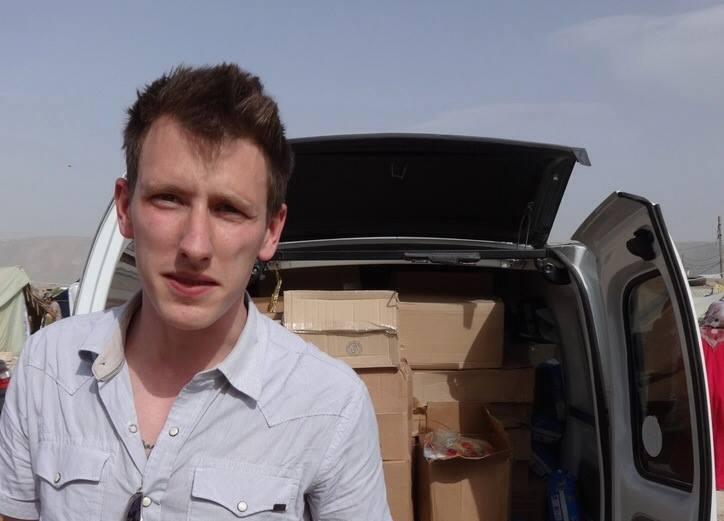How Peter Kassig’s friends are choosing to remember him
Kassig making a food delivery to refugees in Lebanon’s Bekaa Valley, May 2013.
BEIRUT, Lebanon — Peter Kassig was curious, kind and brave. His journey from Indianapolis to the refugee camps of Lebanon and Syria would have been impossible were he not.
He came to Beirut in 2012 during spring break from Butler University in Indiana to learn more about the region in which he had once served as a soldier.
A few years earlier he had fought in Iraq, an experience that changed him dramatically. When he returned to this part of the world two years ago he came with a different mission.
“I wanted to better understand my role in the conflict in Iraq and its impact on the Middle East in general from a personal perspective and from the perspective of the Arab world,” he said in an interview with TIME in 2013, explaining his motivations for coming to Beirut.
He also wanted to help the many Syrians who had been forced to flee a devastating war across the border. He volunteered at a hospital in Tripoli, northern Lebanon, where he used his medical training to treat Syrian refugees injured in the conflict.
Later, he would go even further. At just 24 years old, he co-founded a humanitarian organization called Special Emergency Response and Assistance, or Sera. It was a two-man team, but their reach was ambitious.
The organization delivered aid in the form of food and cooking materials, medical supplies, and clothing in Lebanon and Syria.
Peter would deliver the aid personally to the far reaches of eastern Syria, at a time when journalists would no longer set foot there. When he was there he treated the injured, no matter what their status or affiliation.
He made two trips to Syria before he was taken by the Islamic State, in October 2013, while traveling to Deir Ezzour. He would convert to Islam during his captivity, changing his name to Abdul-Rahman. His family believes the conversion was genuine.
I recently returned to Beirut after four years away. His time here filled that gap in more ways than one.
If it is true that one can judge a man by the effect he has on his friends, then there is no better tribute to Peter. Because to hear the people who knew and loved him talk about and remember him, is to witness something very special indeed.
I never met Peter, but the tight-knit nature of Beirut’s expat community meant we ended up sharing many friends. Over the past few weeks there has rarely been a moment when he was not on their minds.
Whenever they gathered they would share memories, naturally and unprompted. They spoke about his enduring idealism and the crazy places it took him. But most of all his warm nature and kindness.
“He had this way of making you feel good about yourself, which was totally genuine and unaffected,” says Sam Tarling, a photographer and close friend based here in Beirut.
“Amid all the dark shit that was and still is the conflict in Syria he was a rare spark of hope. He had no illusions of grandeur and wasn't trying to save the world but was still adamant he'd do as much as he possibly could, which was somehow comforting to know.”
“Pete was one of those souls you rarely come across in life, but when you do, they stay with you forever,” says Olivia Alabaster, another friend.
“He had this enduring positivity about the world and about people that you don't find very often.”
Michael Downey became friends with Peter when living with him for a time in 2012.
“The couch in our apartment that Pete would routinely crash on, even after he had his own apartment, was the most decrepit, uncomfortable slab of furniture out there. He affectionately referred to is as ‘the donkey farm,' but he didn't mind or complain, he loved his friends and being with people, enjoying life was part of what defined him.”
Josh Wood, who lived in the apartment with the two of them, describes his friend’s infectious compassion.
“It didn't take long after meeting Pete to know he was special. He was a young, clean-shaved kid from Indiana who showed up in the Middle East because he saw an overwhelming need and wanted to help — so he did.
“In the early days, he would use his few words of Arabic to get up to the Syrian border to see the refugee crisis first hand. Peter knew intimately the suffering that war has brought the people of the Middle East and wanted to be there for them.”
There were the little things, too.
Friend Naziha Baassiri remembers how he “gave the biggest hugs every time you saw him. You could hardly breathe.”
Kassig's family has asked that contributions in honor of their son be made to the Syrian American Medical Society, which is working to meet the medical needs of Syrians displaced and injured by war.
Every day, reporters and producers at The World are hard at work bringing you human-centered news from across the globe. But we can’t do it without you. We need your support to ensure we can continue this work for another year.
Make a gift today, and you’ll help us unlock a matching gift of $67,000!
